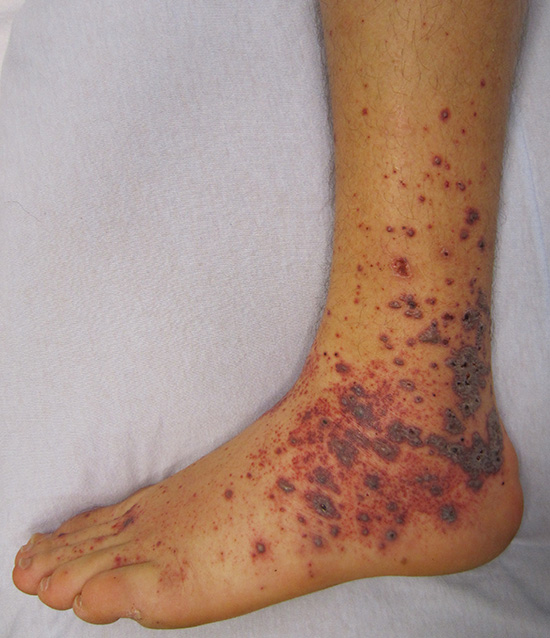Autoimmune Progesterone Dermatitis
How Keeping Your Hormones Balanced Can Help
Autoimmune progesterone dermatitis is considered a very rare skin condition and it's sometimes difficult to diagnose.
Generally, the condition is characterized by a recurring rash, hives, and other allergy symptoms which may appear a week or so before a woman's period and clear up during or shortly after.
The symptoms of autoimmune progesterone dermatitis may or may not recur every month on schedule.
The body is reacting defensively to your natural hormone fluctuations. In many cases, this condition is triggered or exacerbated by artificial progesterone from hormone-based birth control, other medications, or even through xenoestrogens which are industrial chemical compounds that find their way into our bodies.
Typical Medical Treatment
First, sometimes before properly diagnosing the patient, doctors will often prescribe a topical corticosteroid or antihistamine for the skin symptoms. Patients with autoimmune progesterone dermatitis generally agree that these do not help.
Steroids taken by mouth or injection, like prednisone, tend to be more effective. There are many risks to taking drugs like prednisone. Overall, they may help to alleviate your symptoms, long-term use is very dangerous.
A doctor may suggest hormone therapy to suppress your body's progesterone production, once they make the diagnostic connection to your cycle.
In severe cases, when the patient's symptoms are unbearable, doctors recommend complete removal of her ovaries. It does correct the issue. For a woman though, it's an incredibly difficult decision to make.
Hormones and Contraceptives
Using a contraceptive like Depo Provera, which interferes with your menstrual cycle sometimes to the point of not having your period at all, can make it more difficult for doctors to diagnose autoimmune progesterone dermatitis.
When your menstrual cycle is not predictable and determined by your body's natural hormone levels, you can't easily make the connection between your symptoms and your cycle.
Birth control that is intended to disrupt how your hormones work, in an attempt to keep a fetus from attaching to your uterus, can have a much broader effect on your health.
Your hormones interact with the rest of your body to help keep things in balance. Many women experience weight gain and acne when they begin taking a hormone-based birth control pill, so that's a common concern.
Other more serious concerns are perceived as being less of a risk, simply because the effects won't become apparent for several years.
Any hormone-based contraceptive is likely to have a long-term effect on your circulatory system. They make the platelets in your blood stickier, greatly increasing your risk of blood clots, stroke, or heart attack the longer you take the drug.
There is also a hormonal connection to the development of breast cancer, hormone-based birth control may increase growth of tumors.
These are concerns that affect all women. If your body is having an autoimmune reaction to progesterone because of your birth control, it could indicate that you are more susceptible to other side effects as well.
To continue taking hormone-based medications of any kind will probably make it harder for your body to come to a natural balance.
Balancing Your Hormones
When you stop taking synthetic hormones, it takes time for your body to return to normal. After just one Depo Provera shot, it can take up to 2 years for a woman's menstrual cycle to stabilize and become regular.
It may be possible to speed up the process and detox your body in a few months. There are many ways of doing this, depending on your unique body and what is comfortable for you.
Generally, a cleansing and detoxification plan will require a few lifestyle changes that will improve your health overall.
Some of the most widely known recommendations for cleansing are as follows.
Eat lots of fresh fruits and vegetables every day.
Drink several glasses of water throughout the day, you can add a tablespoon or two of lemon juice or apple cider vinegar to each glass.
Start each day with a detox juice made of vegetables and fruit, there are many great recipes available online.
Take a detox bath regularly, there are recipes online for this as well. I've used a mixture of hydrogen peroxide and epsom salts with great results.
Walk every day for at least 20 minutes, breathing deeply.
Work up a sweat for 20 or 30 minutes, but don't exhaust yourself. Use a steam room if possible. Shower promptly to rid your skin of the toxins released.
Since your liver plays a key role in detoxifying your body, its effectiveness can be reduced over time as it collects toxins. Your liver metabolizes hormones and helps keep them balanced in your body, so less toxins in your liver will mean better hormone balance.
There are many things you can do to help detox your liver, like simply avoiding soda, sugar, and refined foods. You can drink unsweetened cranberry juice or lemon juice to help in the detox process.
Some herbal remedies can affect your progesterone and estrogen levels. Common herbs used to treat hormonal imbalances include Siberian Ginseng, Chasteberry, and Black Cohosh.
When you have autoimmune progesterone dermatitis, it may be difficult to tell how your body will react to plant-based hormones. In most cases however, it is significantly less risky than synthetic hormone therapy.
Additional Concerns
Most people don't think twice about all the chemicals we tend to use on a daily basis, but when you have skin sensitivity issues each one can contribute to irritation.
Even many products marketed as hypoallergenic contain toxins that can potentially trigger an adverse reaction.
Little is known about autoimmune progesterone dermatitis, because it is so rare or goes undiagnosed in so many cases. There isn't a great deal of research about contributing factors or risk factors associated with this condition.
You could experience some uncommon or undocumented side effects from various medications.
For example, there is some evidence that girls with autoimmune progesterone dermatitis could be at greater risk for side effects from the new Gardasil vaccine. The vaccine may somehow affect hormone levels and trigger symptoms.
Developing healthy habits and promoting the natural balance of your body is the easiest and least risky way to manage your autoimmune progesterone dermatitis symptoms.
Home > Seborrheic Dermatitis > Autoimmune Progesterone Dermatitis









New! Comments
Share your thoughts about what you just read! Leave me a comment in the box below.